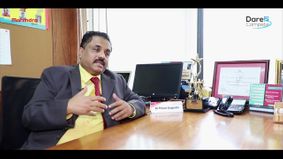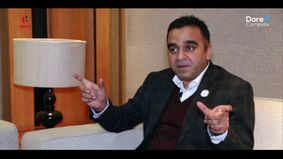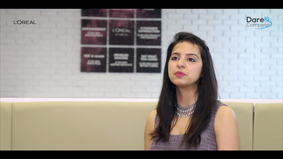- Why Do Hiring Managers Ask- "What Are Your Strengths?"
- How To Answer “What Are Your Strengths?”
- Variations Of 'What Are Your Strengths?'
- 'What Is Your Greatest Strength?' Answer Samples
- Answering What Are Your Strengths: Sample Structure
- Examples Of Greatest Strengths
- Mistakes To Avoid When Answering 'What Is Your Greatest Strength?'
- Conclusion
Guide To Answer- "What Is Your Greatest Strength?" (Samples Inside)

Job interviews are the final stage, leading you to your dream job. With so much riding on it, they make for highly stressful situations, that can leave many feeling perturbed. Now imagine being hit with a subjective question like- 'What are your strengths?' or 'How do you define success?' in an interview when you are already anxious. What are you going to do? Fumble? Well, the answer is simple, don't let it get to that stage and prepare for it in advance.
It is not difficult to anticipate that a hiring manager/ interviewer would ask questions about your strengths, weakness, aspirations, etc. So why not prepare yourself accordingly?
In the spirit of helping you ace that job interview, we have prepared this guide to answer one of the most common interview questions- 'What are your strengths?'. It has everything you need to know to give a mind-blowing answer. So let's get started!
Why Do Hiring Managers Ask- "What Are Your Strengths?"
The most important thing to understand before framing your answer is the intention behind the question. What is it that the interviewer wants to know - once you know this, you can deliver it to them through your answer. This question usually helps interviewers ascertain one or more of the following:
- If you're able to self-assess your skills
- If you have the required experience and knowledge on how to use your positive traits at work
- If your skill set aligns with the current team
- If you can help bridge the skill gap (if any) that exists in the current team structure
Your answer to the 'What is your greatest strength?' question will help the interviewer ascertain your employability, fitness, and emotional intelligence about that particular job role. So try to showcase how the skill sets, credentials, and personality aspects make you a good fit for the role as well as the organization.
For example, if you answer "My strength is my patience", then you should back the claim with an example of being patient helped you at the workplace - and how it can contribute to the current role.
With the intent in mind, take a look at the steps to prepare a comprehensive answer given in the section ahead.

How To Answer “What Are Your Strengths?”
The toughest interview questions are usually the subjective ones, which is why formulating the right answers to questions like this is critical. So follow these steps and frame the best possible answer, all things considered.
Choose the strength/ quality you want to showcase:
The first step is to recognize which of your skills or qualities is best suited for the profile in question as well as the organization. Paying proper attention to the job description and assessing the skills/ strengths needed for the role is key, here. Also, be realistic while doing this and keep the list of strengths as short as possible. Ideally, you should narrow it down to 3-5 key strengths/ skills that are relevant to the job. Because stretching the answer beyond the requirement will only make the hiring manager lose interest in your answer.
Explain its relevance for the respective job role
The whole point of going through the interview process is to convince the interviewer that you are the perfect fit for the role. So once you have selected key skills/ strengths you want to highlight, start by circling back to how they are relevant for the respective job profile. Also, try to loop in how those strengths will help you add to the team and organization as a whole.
Back it up with evidence
Merely stating your strengths and linking them to the job is not enough. Try to back your claims up with evidence. For example, if you have benefited from those strengths in the past, then share those instances in your answer to the 'What are your strengths?' interview question.
Structure your answer well
After having collected all the information you want to give out, make sure your answer is well-structured. You can follow the structure given below:
- Mention the strength and describe how it will help you perform in that role
- Give a proper example of how you made use of it in the past
- Make special mention of the impact you made because of this strength
Practice
One thing that many skip when preparing for interviews is practicing their answers. Practice your sample answers so that it does not sound too mechanical or detached when you are actually in the interview. The purpose is to prove that you are the ideal candidate for the job in question, so make sure that you give a good answer that sounds as natural as possible.
Variations Of 'What Are Your Strengths?'
There are many ways in which an interviewer can ask you this question, like:
- What is your greatest strength?
- What are you good at?
- Mention some of your professional strengths.
- What is your biggest strength?
- Are you good at ______?
'What Is Your Greatest Strength?' Answer Samples
Check out the examples/ sample answers to the question - 'What are your strengths' listed below to get a better idea.
'What are your strengths?' Example Answer for Students/ Freshers
Strength: Thrive under pressure/Think quickly
Just because you are a fresher or lacking in experience does not mean that this question can't be directed at you. Here is an example of how you can give an impressive answer when asked- 'what is your greatest strength?'-
I thrive under pressure and strive to give my best in even the most stressful situations. During my graduation, there were many times when my ability to cope with high-pressure situations proved beneficial. For example, I was extremely unwell and the final team project submission was approaching quickly. I was relying on my team but it turns out they had not made any progress.
As soon as I recovered, I did not waste any time panicking about the limited time we had, instead formulated a quick plan, asked all members to a meet-up, and put things into motion. I divided the project into smaller tasks and delegated them to everyone. In the end, we were not only able to make the submission well within time but also got an extremely high score.
I beleive that my ability to think quickly on my feet and persevere will help me do well in this role and organization.
'What are your strengths?' Example Answer for Experienced Professional
Strength: Technical skills
As an experienced professional, you might be tempted to go on and on about your past experiences, but the point of this question is to showcase something beyond what your resume shows. Here is an example:
My copywriting, analytical skills, as well as people skills, are my biggest strength. With 9+ years of experience in the industry, assessing how to sell something to the target audience and convey a message in the best way, has become like second nature for me. I know how to create the perfect balance between creative and informative approaches while catching eyeballs.
I will use my strong writing skills, and analytical and creative abilities to bring out the best in this team and push for maximum ROI from our campaigns.
Remember: As this answer demonstrates, the answer to this question need not focus on soft skills alone. Your technical skills and know-how can also be a strength.
'What are your strengths?' Answer Sample (Service Industry)
Strength: Communication and People Skills
I have excellent communication skills as well as people skills. Both of these are critical in the service industry and my ability to clearly convey anything I want to the audience will help me do well in this role. While handling any case I begin by taking stock of the situation and then employ my communication skills to help the addressee get the point I am trying to make. It has served me well in almost all spheres of my life and is sure will continue doing so in all my future endeavors.
'What are your strengths?' Answer Sample (Sales Roles)
Strength: Active listening and analytics skills
My active listening skills and analytical skills are my biggest strength which I believe are essential for this industry. As a sales associate, I have cultivated the ability to read prospects by listening to what the client has to say and recognizing what they need, or any objections they have. I then use this knowledge to alter my pitch and mold it to present a solution they can't say no to. Also, I don't give up when things go wrong, instead, I analyze the situation to assess what went wrong during the client interaction and take it forward from there.
'What are your strengths?' Answer Sample (Management Roles)
Strength: Leadership and Time-Management Skills
I have impeccable leadership skills and excellent time management skills. In my previous role, I managed a team of X members and multiple projects at a single point in time. The fact that we handled every task that came our way exceptionally well while meeting all the goals, made me feel great and I thrive on that feeling.
With the help of my organizational skills, I planned and organized every project such that all my team members got the opportunity to participate. learn something new, and refine themselves. I believe in cultivating a healthy and safe work environment where all my team members can be the best versions of themselves and continue to grow. I also organized multiple training programs to help them achieve their full potential, and work towards the fulfillment of their own aspiration while ensuring that the company benefits from their efforts.
'What are your strengths?' Example Answer (HR Roles)
Strength: Patience and Communication
My strenth is my patience and communication skills. I have been cultivating these skills since my first job as an HR representative and have used them to the best of my abilities in managing large teams. Over time I have also developed great conflict resolution skills that helped me mediate and resolve any issues that arose in my previous company.
'What are your strengths?' Example Answer (Marketing Roles)
Strength: Organization Skills and Creativity
I consider my organization skills, ability to out of the box, creativity, and compelling storytelling abilities to be my biggest strength. I have carefully cultivated and honed every one of these skills and they played a key role in my success in the industry. The job of a marketeer is never done, but it becomes a little less tedious if you organize and plan everything you want to get done well.
And the ability to come up with creative ways to market or advertise a product and create an engaging narrative/ complete story around it are integral when preparing a successful campaign. As is evident from my portfolio I have formulated multiple successful strategies, plans, and campaigns, and if given the opportunity I assure you that I will bring the same passion and dedication to this role.
These are just a few sample answers to the common question- 'what are your strengths?' or 'what are your greatest strengths?'. These should give you a better idea of what your answer must look like. And to make things even simpler for you, we have even prepared a list of greatest strength examples in the section ahead.
Answering What Are Your Strengths: Sample Structure
Still finding it hard to frame the answer to "What is your strength"? Here's a sample structure you can adopt:
Sample Answer Structure:
I believe I am extremely {STRENGTH}. I've been in various situations where I've discovered that this {strength} has helped me. For example, {past encounter where you used the said quality/strength}. I can see that even in the current role, this {strength} would come in handy when handling {tasks listed in the job description}.
Sample Answer: Let's use the above structure to frame an answer. We will consider the situation where patience is a strength.
My strength is my patience, which helps me stay calm in stressful situations. It may not be the flashiest trait, but it's a multifaceted quality that has served me incredibly well throughout my career, especially in situations where we faced hectic deadlines. Because I was patient, I was able to guide my team and look at the projects objectively, breaking the deliverables down into manageable tasks. Uncertainty is part of any job role, but my patient outlook will help me analyze the situation clearly, prioritize tasks effectively, and work steadily towards solutions without panicking. This calmness also helps me reassure and motivate team members during stressful times.
Examples Of Greatest Strengths
We are sure that by now you have some amazing ideas about how to go about framing your answers. However, before you do that, check out the examples of the greatest strengths/ skills listed in the table below. We have segregated these into categories as per various job types.
| Job Type/ Category | Greatest Strength |
| Creative Roles |
Active listening skills, critical thinking, writing skills, out-of-the-box and quick thinking, crucial design ability, passion, proactivity, adaptability, communication skills, innovation, and resilience. |
| Analytic Jobs | Critical skills, analytical thinking, attentive/detail-oriented, organizational skills, persuasive speaking and writing skills, interpretation of data/ recognizing patterns, troubleshooting, visualization. |
| Management Jobs | Excellent time management skills, detail-oriented, versatile, public speaking skills, analytical skills, leadership and entrepreneurial skills, organizational skills, ability to delegate, handle conflicts, mentoring, mapping, and progress analysis. |
| Communication Jobs | Excellent communication skills, public speaking skills, observation ability, de-escalating conflicts, negotiating, storytelling, receiving and giving feedback, and ability to handle tough conversations. |
| Writing Jobs | Writing skills, attention to detail, analytical skills, observational skills, informed, research abilities, adaptability, communication skills, good grammar, and vocabulary. |
| Teamwork Strengths | Team player ability, collaboration skills, active listening skills, reliable/ dependable, dedicated, persistent, accepting of critique/ feedback, helpful, open to suggestions. |
| Work-style Strengths | Strong relationship building, reliable, honest, patient, respectful, flexible, versatile, multitasking, adaptable, proactive, switching between multiple tasks. |
These are some common strengths/ skills that you can use when framing your answer to the question, 'What is your greatest strength?'.
Note: These are only examples of strengths and not an exhaustive list. Feel free to include any professional/ personal traits (personal/ professional strengths or traits) you think fit the bill for the profile that you are applying for.
Mistakes To Avoid When Answering 'What Is Your Greatest Strength?'
As a cautionary note, we have listed a few mistakes that many people tend to make when answering such subjective/ behavioral interview questions. Do take note of them and put your best foot forward with a concise interview answer.
- Don't be unaware: The first mistake is never saying- 'I don't know' or 'It depends' or some derivative of this phrase. This indicates that you are not self-aware and leaves a bad impression on the interviewer.
- Give a balanced response: Don't go overboard, but also don't be too humble. Sitting in an interview trying to convince someone why they should hire you is not the time to be shy. So, try to find a balance between the two if you want to leave a lasting impression.
- Don't be vague: Being clear and concise in your answer and getting straight to the point is the way to go.
- Don't ignore the JD: Many people end up ignoring the job description beyond a certain limit. Don't do that, instead, look for clues to the skills interviewers are seeking in the job posting/ description.
Conclusion
Drafting a proper answer to the question- 'What are your strengths?' takes conscious effort. But following the steps of job description analysis, followed by listing personal/ professional strengths according to relevance for the job, and then framing a proper answer is the best way to go. Don't forget to avoid the common pitfalls mentioned along.
Looking for more such interesting reads, check out the following:
An economics graduate with a passion for storytelling, I thrive on crafting content that blends creativity with technical insight. At Unstop, I create in-depth, SEO-driven content that simplifies complex tech topics and covers a wide array of subjects, all designed to inform, engage, and inspire our readers. My goal is to empower others to truly #BeUnstoppable through content that resonates. When I’m not writing, you’ll find me immersed in art, food, or lost in a good book—constantly drawing inspiration from the world around me.
Login to continue reading
And access exclusive content, personalized recommendations, and career-boosting opportunities.
Subscribe
to our newsletter















Comments
Add comment